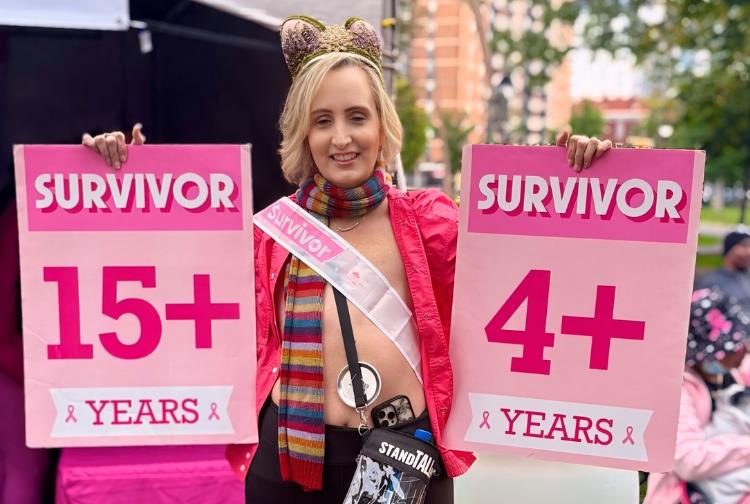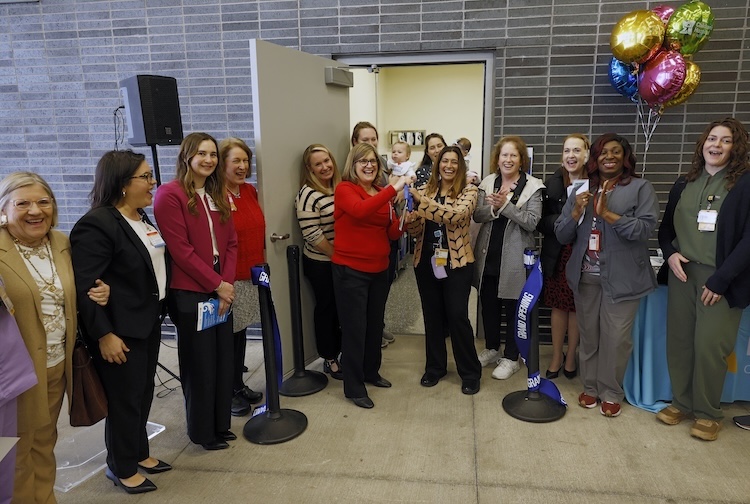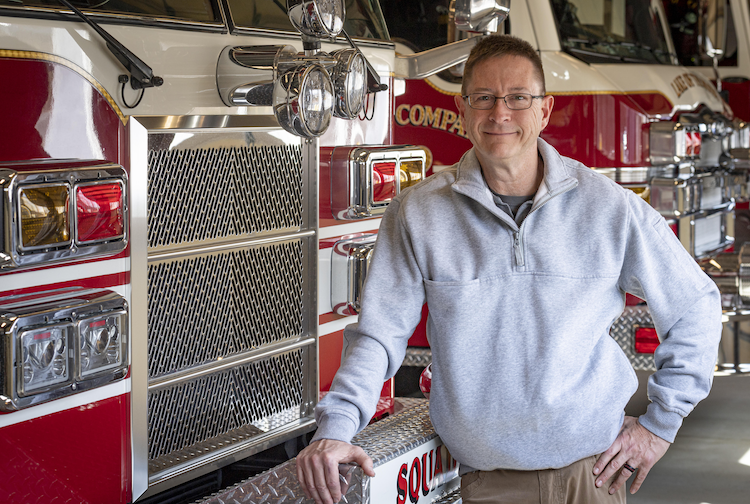‘Helping others live’: Breast cancer survivor’s experience at VCU Health inspired her advocacy work
After a heart failure diagnosis following cancer treatments, Beth Rutherford says VCU Health Pauley Heart Center’s cardio-oncology team helped her move forward.
November 13, 2025 Beth Rutherford is a breast cancer survivor and advocate. She came to VCU Health Pauley Heart Center after being diagnosed with heart failure due to side effects from chemotherapy. (Contributed photo)
Beth Rutherford is a breast cancer survivor and advocate. She came to VCU Health Pauley Heart Center after being diagnosed with heart failure due to side effects from chemotherapy. (Contributed photo)
By Tanner Lambson and Sara McCloskey-Nieves
Beth Rutherford’s bold and unflinching energy is apparent the moment she walks into a room wearing a bright yellow jacket that reads, “TAKE UP SPACE.”
A fighter and survivor, the 54-year-old has been through the wringer with multiple breast cancer diagnoses and a diagnosis of metastatic melanoma. Beth has endured chemotherapy, radiation and multiple surgeries, including a mastectomy with reconstruction. After she received breast implants, she experienced severe complications that resolved only after she had the implants removed in 2019.
“You don’t go back to who you were before cancer,” she said. “You become someone new — and that’s okay.”
Quick witted, sharp-tongued and deeply honest. Beth takes up space in any room she goes in and tells it like it is.
“My first doctor would talk to my husband instead of me,” she said, explaining what the bedside manner was like during her initial cancer treatment in 2007 at another hospital. “I had to say, ‘Over here dude, I’m the patient.’”
Beth has taught me that survivorship isn’t about going back — it’s about moving forward. And she’s doing that with courage and a lot of heart.
Wendy Bottinor, M.D., MSCI, cardio-oncologist at VCU Health Pauley Heart Center
But after spending years advocating for herself, Beth faced a new challenge – healing her heart.
About a year after “going flat” and removing her post-mastectomy breast implants, Beth began experiencing chest pain. A CT scan revealed she had fractured her sternum during a recent trip — and new issues with her heart.
That’s when Beth was referred to the cardio-oncology team at the VCU Health Pauley Heart Center.
“We were trying to piece everything together. Was it the chemo? The surgeries? Something else? Beth’s case is complex. She had been through so much — multiple cancers, recurrences, surgeries and the long-term effects of treatment,” said Wendy Bottinor, M.D., MSCI, who is Beth’s cardio-oncologist at Pauley Heart Center. “But what stood out to me was how high functioning she was despite it all. She was taking care of her daughter, managing her household and still always showing up for herself.”
Beth’s heart problems were likely a delayed side effect of Adriamycin, a chemotherapy drug that is known to be cardiotoxic. She was ultimately diagnosed with heart failure.
Collaboration at the core of cardio-oncology at VCU Health
From the start, Beth noticed a difference in her care at VCU Health compared to other hospitals she’s been to. During her cancer journey, Beth had some unpleasant moments with other doctors.
“My experience at VCU Health has been entirely different — especially under Dr. Bottinor’s care. The integration between oncology and cardiology, and the compassion behind every decision truly reflects what modern survivorship care should be,” she explained. “It’s the kind of teamwork and attention that helps patients feel seen, heard and supported through every stage.”
 Wendy Bottinor, M.D., MSCI, is a cardio-oncologist at VCU Health Pauley Heart Center. (Tom Kojcsich, Enterprise Marketing and Communications)
Wendy Bottinor, M.D., MSCI, is a cardio-oncologist at VCU Health Pauley Heart Center. (Tom Kojcsich, Enterprise Marketing and Communications)
The cardio-oncology team at the Pauley Heart Center collaborates with the experts at VCU Massey Comprehensive Cancer Center to provide seamless heart care before, during and after cancer treatment. Cancer treatments can impact heart health, especially if a patient has any pre-existing conditions, like high blood pressure or high cholesterol, or have a family history of heart disease.
As part of a university-based health system, Pauley Heart Center also participates in clinical trials to test new treatments for heart disease. That’s how Beth was able to enroll in a clinical trial Bottiner is leading, TREAT HF (heart failure). The study is investigating whether early intervention with heart medications could prevent further damage to the heart in cancer patients and cancer survivors.
“She actually felt a lot better on sacubitril-valsartan (the medication being tested in the clinical trial),” said Bottinor, who is also a cancer prevention and control researcher who treats patients in affiliation with Massey Comprehensive Cancer Center. “Her MRIs improved, and her symptoms eased.”
Today, Beth routinely checks in with Bottinor at follow-ups to make sure that her heart stays strong as she continues to navigate her oncology care. Because the risk of heart disease is higher for cancer survivors, Beth will likely see a cardio-oncologist for the rest of her life.
Leading with her heart, Beth becomes an advocate
Beth learned to advocate for herself during her years of cancer treatment and also became an advocate for others as a caregiver; one of her children lives with a disability.
“That’s a major part of my story, and why I speak out – not just as a patient, but as a mother navigating systems that don’t always see us,” she said.
It took years for Beth to feel seen and heard in medical spaces. When she met with doctors about problems with her breast implants at another hospital, she felt like she wasn’t being taken seriously.
“I’m not trying to make anyone feel bad about getting implants,” she said. “I had them. I really do get it. But if you’re having symptoms [with the implants] and [your doctors are] telling you you’re crazy — it might not be in your head.”
So, she leaned into advocacy — not only for herself, but for other breast cancer and cardio-oncology patients. Beth began advocating for breast implant illness, flat visibility and survivorship equity, sharing the complicated story of her breast cancer diagnosis and health problems caused by breast implants. She speaks at events, has participated in Heart Month campaigns and even walked in a fashion show to raise awareness about the stigma women face if they don’t have breasts.
The integration between oncology and cardiology, and the compassion behind every decision truly reflects what modern survivorship care should be. It’s the kind of teamwork and attention that helps patients feel seen, heard and supported through every stage.
Beth Rutherford, VCU Health patient
After a mastectomy, some people choose to undergo breast reconstruction to restore the shape of the breast, while others opt for aesthetic flat closure, which smooths the chest wall without reconstruction. Some may even choose to “go flat” without reconstruction or aesthetic flat closure — this is the route Beth chose.
“I’m trying to get more into the culture of [the “flat”] community,” she said. “Not just surviving, but living and helping others live, too,” she said. “You don’t have to be reconstructed to be whole.”
Bottinor echoes that sentiment. “Survivorship isn’t necessarily about trying to return to the person you were before diagnosis,” she said. “It’s about embracing who you are now. Beth is a great example of that. She’s proud to share her experience and her decision to go flat. She’s not trying to look like she did before — she’s accepting how her body is now.”
Today, Beth continues to advocate for better care, more awareness and a health care system that listens to patients. She’s a voice for the flat community (affectionately called “flatties”), a champion for cardio-oncology and a reminder that healing isn’t just about medicine — it’s about meaning.
As someone who has witnessed Beth’s journey to become an advocate, Bottinor puts it best: “Beth has taught me that survivorship isn’t about going back — it’s about moving forward. And she’s doing that with courage and a lot of heart.”
Inspired by Beth’s story? Read more about our patients and providers.
Check out more heart health stories on the Pauley Heart Center Blog.




